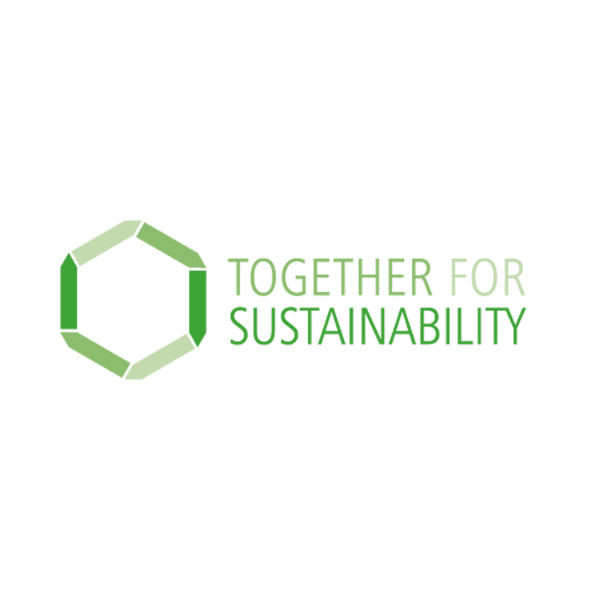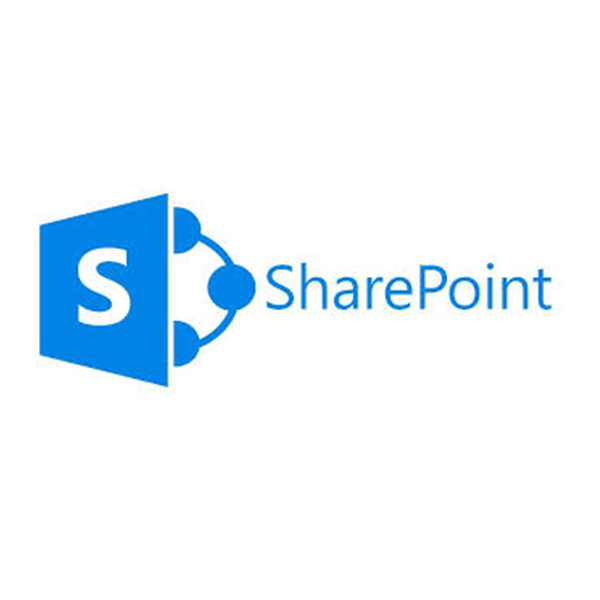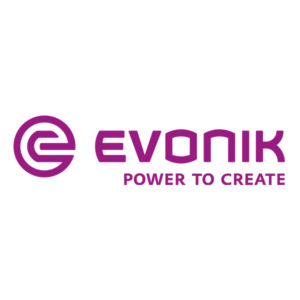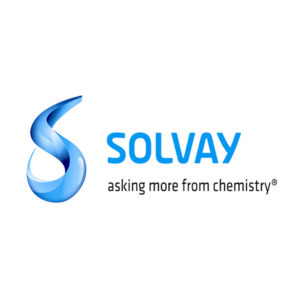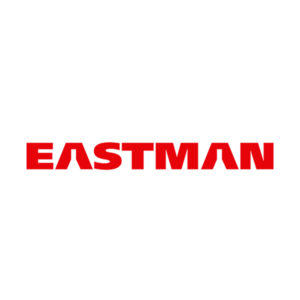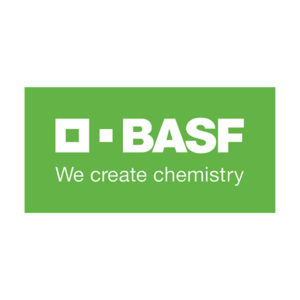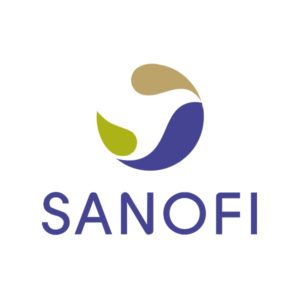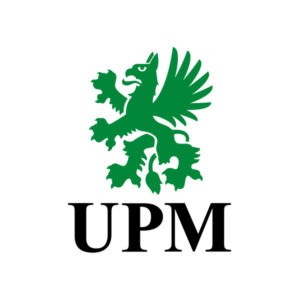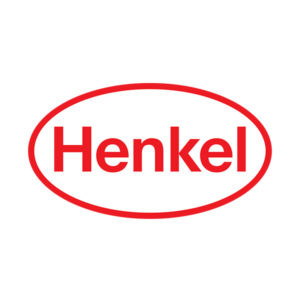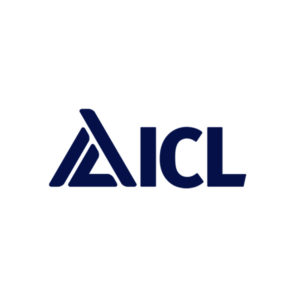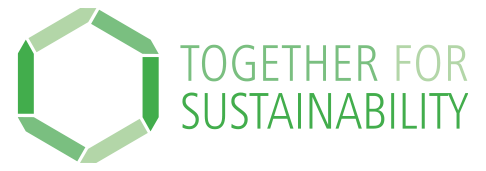

Together for Sustainability - Chemical Supply Chains for a Better World
March 2021
Your privacy is important to us. We collect the above personal data to include you in our mailing list and share our newsletter with you. To know more on the way we process your personal data, take a look at our Privacy Notice. You can unsubscribe from our newsletter at any time. If you are not part of TfS community, by submitting this form you consent to our processing of your personal data.
Almost finished...

Dear reader,
Welcome to the first TfS Connect - providing insights, updates, and background information on Together for Sustainability (TfS).
TfS is a member-driven initiative in assessing and auditing the sustainability performance of supply chains for both chemical companies and their suppliers. It enables continuous improvement of sustainability performance through company-supplier collaboration.
Over the past ten years, TfS has grown into the de facto standard for social, environmental and governance performance of chemical supply chains. For our member companies, TfS has become a key part of their corporate and CSR strategies and performance reporting.
TfS is propelled by its members, represented in 5 workstreams (Governance, Processes, and Partnerships – TfS Assessments – TfS Audits – TfS Communications and Capability Building – and Scope 3 GHG Emissions) as well as regional teams.
We encourage you to forward this newsletter to your Buyers as well as CSR, Investor Relations, Public Affairs and Human Resources colleagues. They, too, may subscribe and learn how – together - we are building a better world through sustainable supply chains.
Should you have any queries, please do get in touch.

Higher
Standards
Workstream Governance & Partnerships - Ensure a TfS ecosystem fit for purpose

WS1 is instrumental in transforming TfS into an organisation focusing on broadening its impact.
In 2017-2018, WS1 developed the new impact KPIs which are now entering their third year of implementation. These revised KPIs provided the opportunity for member companies to better align their own objectives with those of TfS while measuring and improving the impact of TfS.
Likewise, as 2020 was looming closer and the Vision 2020 strategy was drawing to an end, WS1 started to work on a new strategy in 2019: scouting for partners, drawing an RfP, selecting a reputable partner, driving the strategic exercise, coordinating inputs and securing buy-in from all stakeholders. WS1 is now ensuring the proper execution of the resulting “Grow and Deliver” strategy.
Some exciting topics are on the horizon for 2021, including:
What does human rights due diligence mean for TfS?
Should different tiers of memberships with differentiated fees, offerings, and obligations be considered?
- Do the TfS articles of associations and onboarding guidelines need refreshment?
More information on the TfS Grow&Deliver strategy 2020-2025:
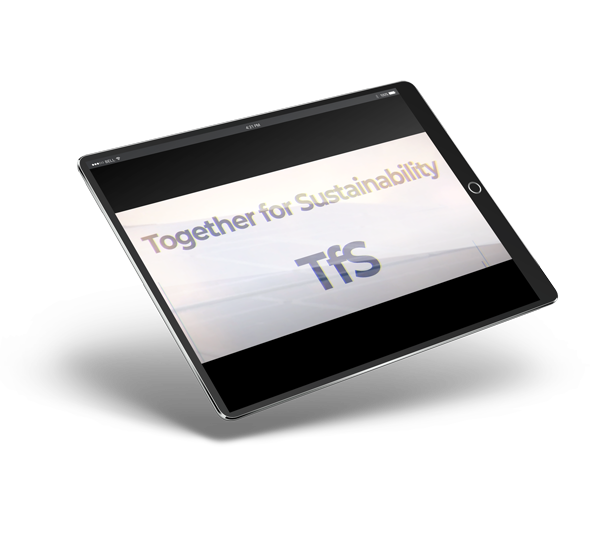

Workstream TfS Assessments - Your direct link to EcoVadis
WS2 has defined the process as follows:
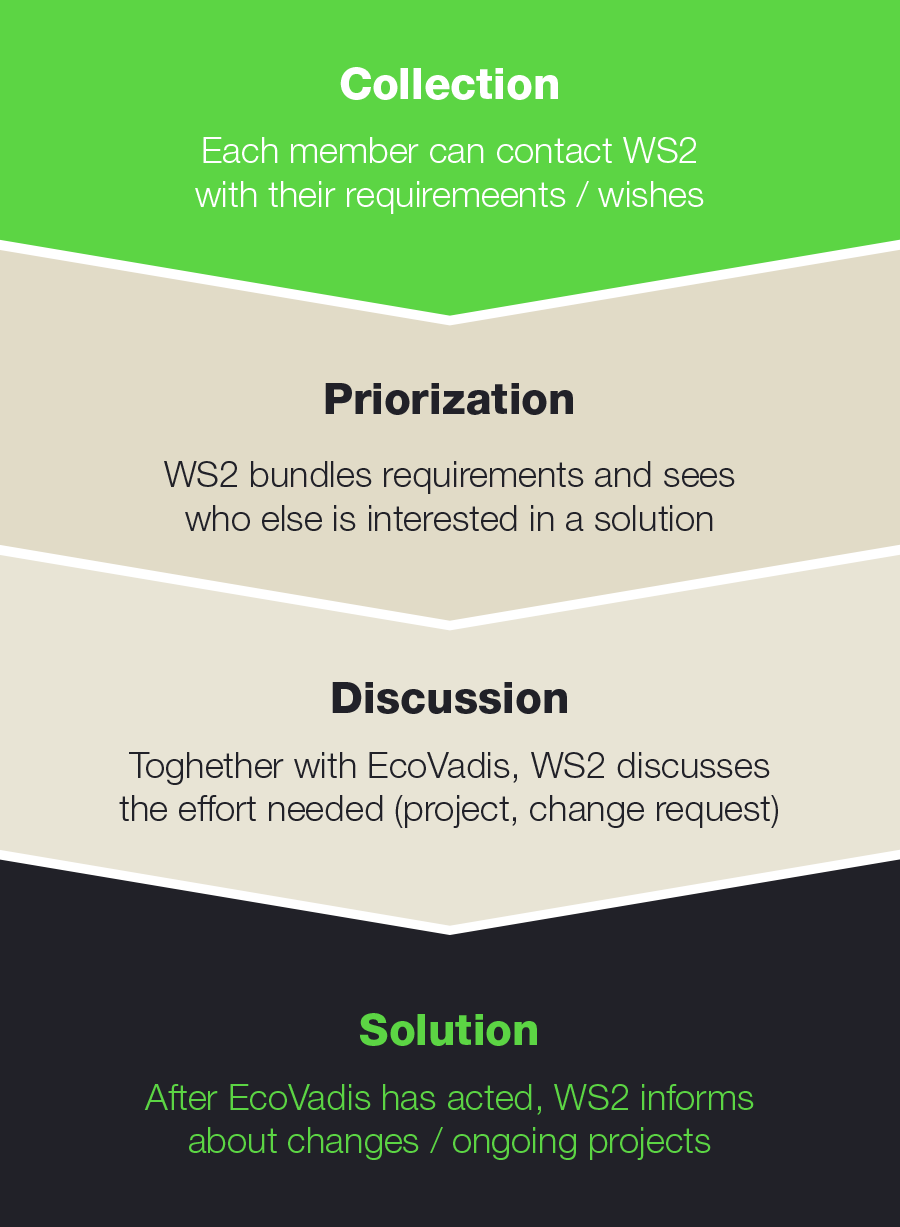
Currently, WS 2 has 9 members:
Team members:
Tableau – a new tool for a better understanding of TfS Assessment results
The project is clustered in 3 steps:

1 Transfer

2 Insert

3 Integrate
Step 2 has also been realised with Klipfolio KPI reporting accessible in Tableau. We still see some slight differences in data. Nevertheless, data solely from Tableau will be used in official reporting from January 2021 to avoid confusion.
Step 3 will start in February with a common workshop to identify which further reporting might be needed to be able to exploit the database for efficient data mining. There might be two different types of reporting needed: ad-hoc reporting for better understanding and reporting needed on a regular basis. Valuable input to step 3 was collected during our virtual TfS workshop in 2020.
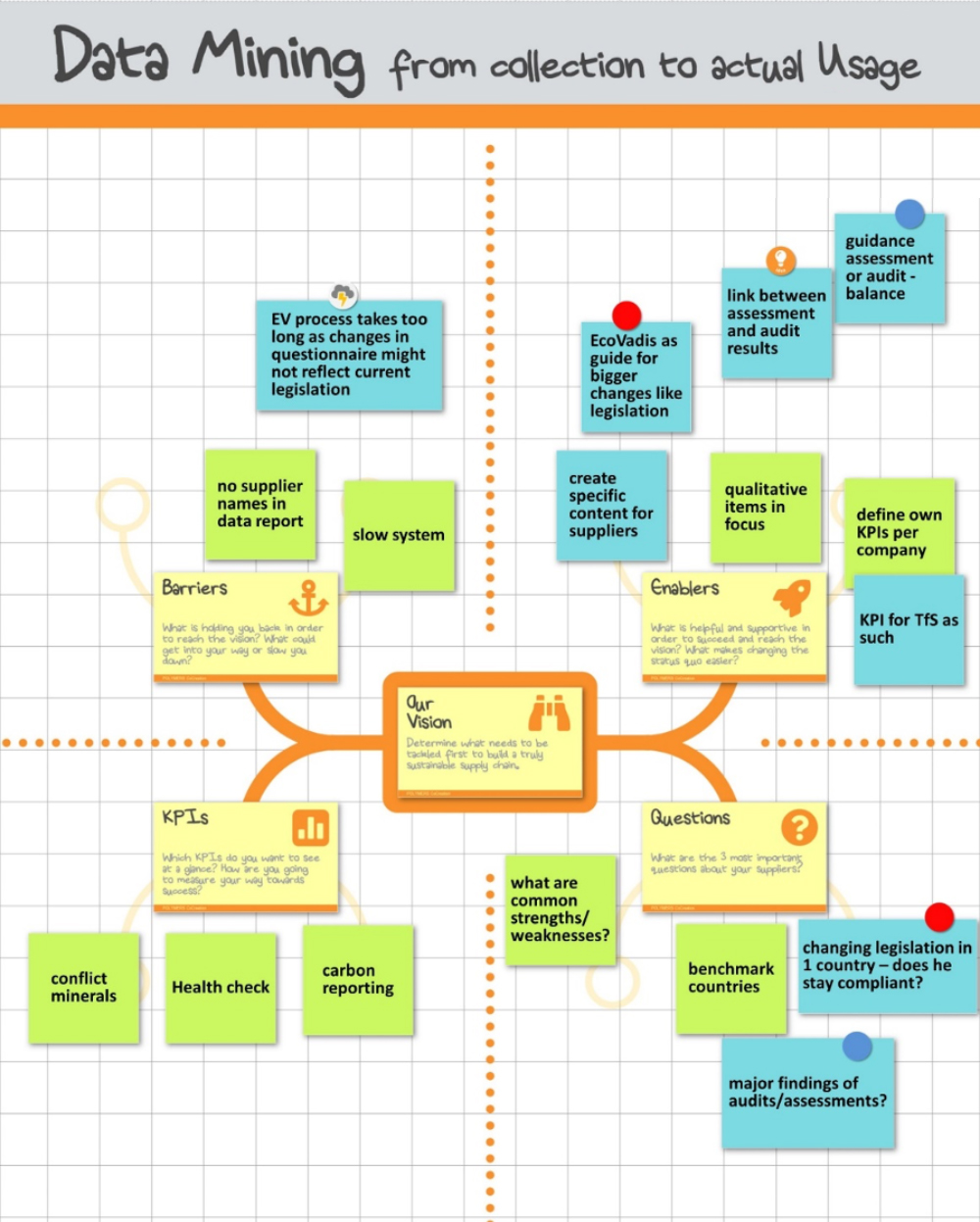
Your reflection / contribution appreciated!
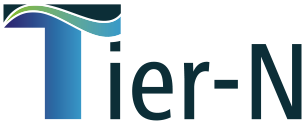
TfS-EcoVadis - Tier-N supply chain transparency project becomes permanent offer
From September 2020, TfS ran - in collaboration with EcoVadis - a pilot on multi-tier transparency in the supply chain. All TfS members were called to participate in the pilot and invite their direct – Tier 1 - suppliers to invite their direct – Tier 2 – suppliers.
This approach is based on the experience that sustainability requirements need to be discussed in the business relationship and become part of procurement decisions; each supplier reaches out to his suppliers in turn. This way, the successful approach of working with direct suppliers is cascaded further down the supply chain.
In January 2021 pilot results showed 7 TfS members participated and 3 members were successful in getting Tier 2 suppliers invited; 47 in total.
TfS Tier-N pilot turns into a permanent offer for TfS member companies
Timeline
A clear timeline facilitates the process as well as the enrollment of new Tier 1 suppliers. The recurring timeline of 4 months is shown below.
Tier-N Process scheme
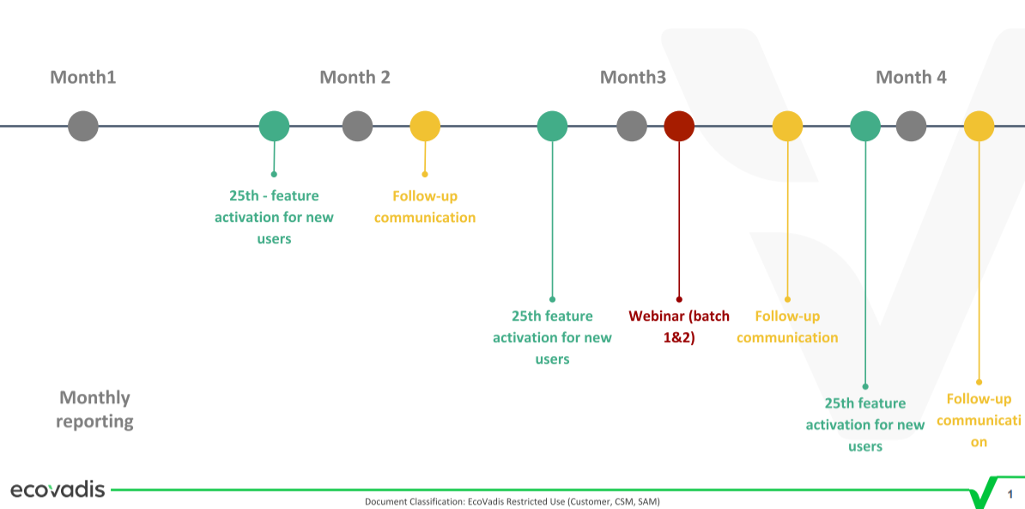
Interested in the Tier-N project?
Continuously improve the TfS Audit process for better supplier performance
The varied background of the WS3 members ensures that we always look at issues and projects from multiple angles. This can invariably lead to differing views, but it also ensures that all perspectives are considered in discussions and that our deliverables are as universal as possible.
Last year, we successfully improved the TfS audit follow-up process, making it simpler and easier for members and suppliers to report on the progress of their corrective actions.
The process now is more flexible, allowing members to report on progress based on discussions with their suppliers, in addition to the formal follow-up audit by an audit company.
Equally, the status of progress is now more visible as progress reports are updated monthly and made accessible to all member companies.
In addition, we developed 2 new audit KPIs to track:
- The number of valid audit reports in the audit pool
- The number of audits reports brought in the audit pool per member per year
Building on these achievements, this year our workstream will turn its attention to 3 new projects which all fit in the broader TfS Grow & Deliver initiative:
- Setting up an audit IT database that will allow us to better mine and utilise audit data to identify common pain points and trends
- Closely linked to the above, developing an approach to use the output of the IT database to help TfS prioritise the areas where suppliers should be engaged
- And finally, looking forward, defining the future role of TfS Audits
With online audits, TfS Audits adapt to the new normal
Common subjects and challenges to understand and consider:
- experience and practices in applying remote audits from both audit companies and TfS members
- potential impact on the audit process and parameters (preparation, duration, pre-conditions)
- limitations and challenges (e.g. social elements, location, (IT) technical issues, confidentiality, privacy and anonymity, data security)
TfS Audits are performed by sustainability auditors from TfS-approved audit firms SGS, Intertek, DQS and ERM.
A couple of TfS remote audit pilots have already been conducted. The outcomes will be shared soon.
Interested in virtual audits?
TfS members who would want to know more about virtual audits can reach out to Jakob Smets, TfS Manager.
Interview with Justin Bettey, Intertek, on his learnings with online audits

Q. Why did Intertek set up online sustainable audits?
Intertek has been developing online audits and assessments via our Inview platform since 2019. Inview can be used for many reasons including accessing remote or high-risk geographies and sites where it could be dangerous for an auditor to attend in person. Remote audits also eliminate travel costs, save time, and help reduce the carbon footprint of the assessment. We accelerated the use of online audits last year in a response to the pandemic and the need to support our customers in maintaining visibility into their operations and supply chains when travel was restricted.
Q. When can an online audit be successful and when should it be refused?
An online audit is not appropriate for every scenario and a risk-based approach needs to be undertaken. If the fundamentals of the audit cannot be assured, meaning the scope, verification, and triangulation, it should be re-considered and possibly only a partial audit undertaken virtually, or not at all. Examples of this are when a site is very large, with complex operations and the auditor (via a remote device) may not get a good understanding or perspective of the risks due to not physically being there. Another example is when a site may have significant human rights risks and the confidentiality and safety of interviewing workers cannot be assured and a remote audit could be putting them at risk.
Q: It is not easy to assess human rights and labour conditions via an online audit. What is a good approach?
It is fundamental in any social-based audit that workers are central to the process. A good approach here is to pre-inform workers about the interview process and the technology used for the interviews and explain the safety and confidentiality controls. In higher risk scenarios, group interviews are a better option, but without inclusion of sensitive or personal questions. The auditor should also remotely scan the room to ensure only approved workers are in the room for interviews, that the workers are comfortable and that no recording devices or management representatives are present. Where full interviews are not possible, Intertek will often advise web-based worker surreys to be undertaken to collect additional workers’ voices.
Q: After almost a year of Covid-19, which provided ideal test conditions, what have you learned?
After conducting more than a thousand online audits, we have learned a lot. The remote approach works and has a high-level of comparison to onsite audits. It has become a flexible tool that clients and suppliers like. When combined with other assurance activities such as risk modelling, SAQs, and self-reporting, it really is helping inform our clients of risk and opportunities for improvement.
Q: Is there an industry sector and region that stands out in virtual audits?
Not specifically, as our Inview technology is industry agnostic. However, due to the nature of the remote approach the favoured sectors and sites are those with a good WiFi connection, organised management systems and personnel and a site well-organised with access to all activities, areas, and workers.
Q: Will online audits continue to exist even after the pandemic?
Certainly. We see online audits have become another “tool in the box” that is complementary to other types of assurance activities we deliver. As technology advances in our industry, we also see virtual engagement with our clients’ sites, supply chain and workers as moving away from a reactive approach to almost real-time reporting where risks and performance can be quickly reported.

Collaborative
Action
TfS Capability building framework & concept
The project includes the development of essential elements such as the introduction of an attractive learning environment, the development of an impact measurement system, and accompanying communication measures to attract learners from both main target groups.
The project for the TfS Capability Building Framework & Concept is comprised of three phases:

Phase 1: Capability Building Framework
The first project phase was kicked-off in mid-August 2020 with the goal to provide a comprehensive overview based on facts and insights gained from interviews and meetings. In the course of this first analysis phase, 1,349 TfS Audits were analyzed, more than 9,500 EcoVadis assessment via the EcoVadis Tableau Dashboard viewed, meetings with all regional TfS teams conducted, 25 comparable and complementary initiatives analysed, and the answers of 21 members evaluated and incorporated into a TfS Capability Building Framework that was introduced to the TfS community in December and January 2021 in two webinar sessions and via this presentation.
The TfS Concept & Piloting Phase
Resulting from the analysis phase and the main findings, the concept and piloting phase will start with the training development in five focus areas which will be implemented throughout three modules:
Focus areas
- Business Partners / Sustainable Supply Chain
- Emergency Preparedness
- Working Hours
- GHG Emissions
- Focus Materials (incl. Conflict Minerals)
Modules
Module I: Knowing
Module II: Understanding
Module III: Acting
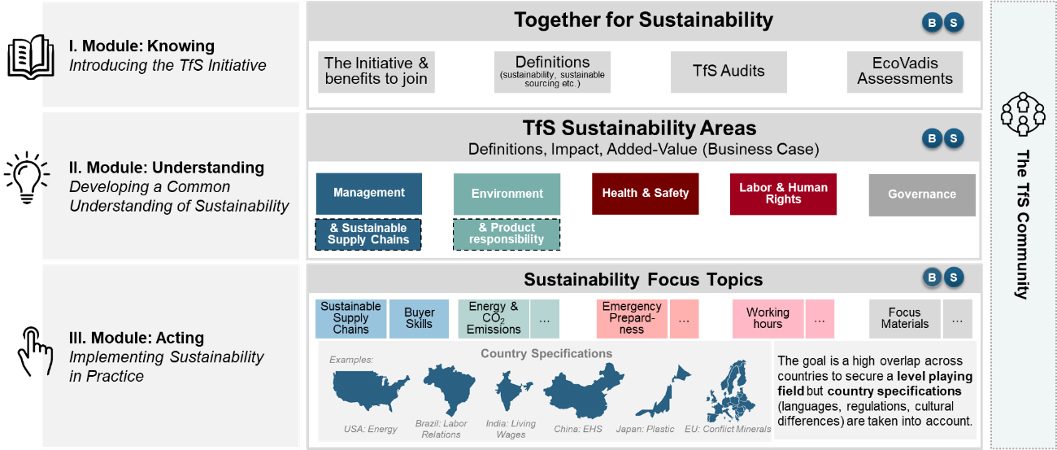
The overall learning objectives that we aim to achieve are:
- Buyers and suppliers know the TfS initiative, the benefits of participating and the methodology and tools used.
- Buyers and suppliers have a common understanding of sustainability, TfS expectations and sustainable supply chains in the chemical industry.
- Suppliers understand their impact on and the added value of sustainability for their own business activities regarding relevant topic areas.
• Management & Sustainable Supply Chains
• Environment
• Health & Safety
• Labor & Human Rights
• Governance - Suppliers have the necessary capabilities to continuously improve their sustainability performance regarding the named topic areas and (country-) specific topics.
- Buyers have the capability to convince suppliers to participate, to interpret their suppliers’ sustainability performance and their ability to improve.
- Buyers (and suppliers) understand TfS as a community for collaboration.
Timeline
The concept and piloting phase is planned for the first half of 2021 while the global roll-out will gradually start from Q3/2021.
Your reflection / contribution needed!
The Capability Building project team is currently looking for an attractive Learning Management System or Learning platform for the training provided to the TfS buyer and supplier community. If you know a platform that you would recommend to the team, please contact Astrid Bosten. If you have a corporate learning manager that could support the team in a sounding or advisory role, please do let us know.
TfS engages for climate protection with new workstream on scope 3 GHG emissions
Kicked-off in late 2020, WS5 is now detailing its work program for this year.
Reducing their own GHG emissions and those in their supply chains in line with scientific guidance is an issue of relevance to the chemical industry. As companies have direct control over their scope 1 and 2 emissions, they can put targeted action in place for reduction. Scope 3 emissions are a result of the supply chain entering and leaving the companies´ area of direct control. This means that companies have only indirect control over scope 3 emissions. Nevertheless, they are aware of their responsibility to impact and reduce GHG emissions up and downstream of their own operations which are linked to their own business activities.
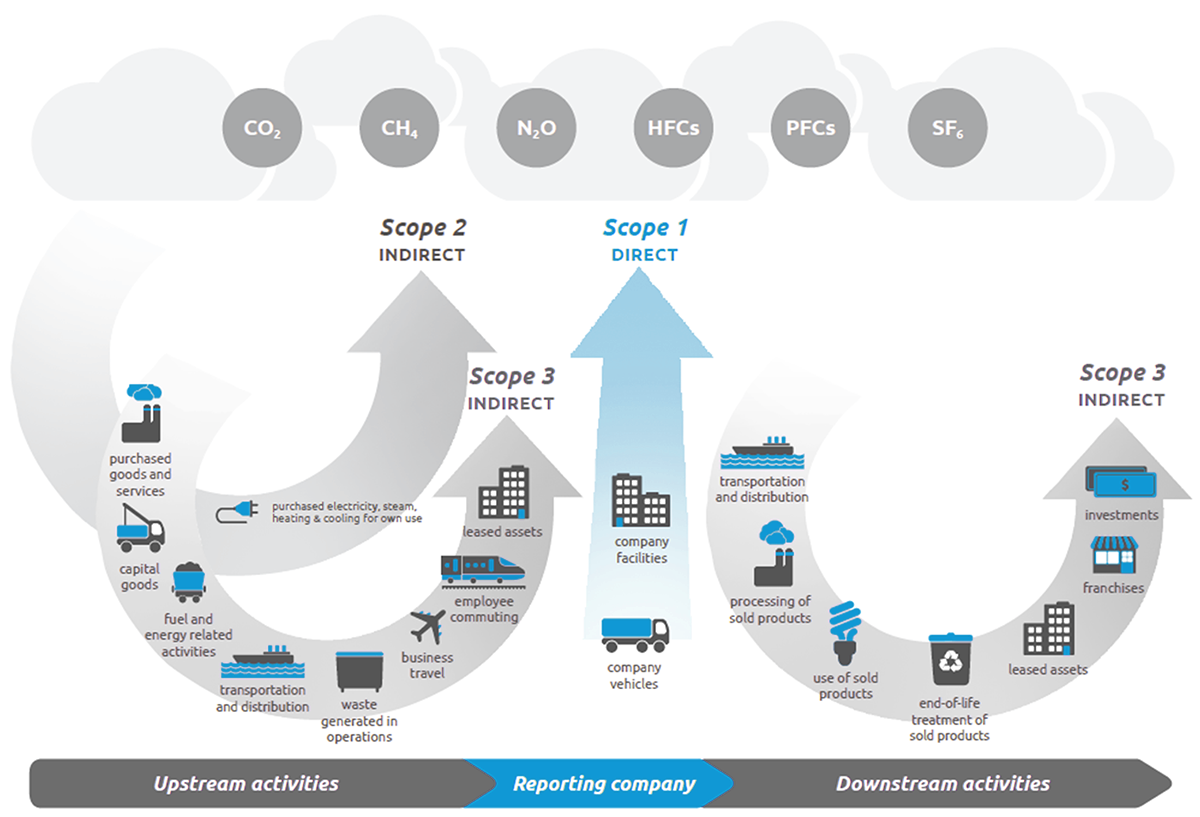
Using the potential of the TfS industry initiative to create awareness and reach suppliers at larger scale, TfS member companies decided to cooperate to increase the pace and scale of impact. The objective of WS5 is to develop pragmatic approaches to measure GHG emissions data as well as to obtain it from their suppliers and share it across TfS member companies. It is paramount that the collected and shared data are consistent, reliable, robust and effective.
WS5 centers around four work packages:
- standardisation of approach to measure GHG emissions data
- design of data collection & sharing approach
- engagement of suppliers to improve and
- co-operation with external stakeholders and providers.
WS5 already designed objectives for each work package and is currently transferring them into a roadmap with clear deliverables, sequencing, and milestones.
An efficient reporting methodology in line with global standards
The first work package deals with a standardised approach to measure GHG emissions data which shall meet the typical reporting boundaries and basic principles. The aim is to jointly develop an accepted, audit proof and efficient scope 3 reporting methodology in line with pre-existing global standards (e.g., GHG Protocol), which can be applied by all TfS member companies and beyond in the chemical industry. Current discussions indicate that more detailed guidance and requirements could be created on such topics as circular materials and complex value chain situations. In the end, all companies want to find ways to significantly increase the share of primary data and product-specific emission factors for raw materials.
The second work package aims to design an accepted and implementable, adequate, phased data collection approach amongst TfS members that is faster than a stand-alone solution. Using the TfS platform will maximise its reach with measurable efficiency gains. In the emerging field of solutions for GHG management, the work package will closely monitor and test the market to learn fast and establish a pragmatic but efficient solution that can be used by all TfS members and beyond.
Thirdly, the WS will make best practice for supplier engagement accessible amongst and for TfS member companies. This is of high importance as buyers have only indirect influence on their upstream suppliers and need to find ways to effectively generate impact.
Finally, TfS will be in continuous dialogue with selected external stakeholders and providers to track developments and provide expertise on global standards and guidelines. As we understand GHG emission reductions as a global challenge that needs to be tackled with consistency and speed, we are open to partner with initiatives that have the same ambitions.

Stronger
Community
TfS launches #TfSTalks to foster exchange of experience
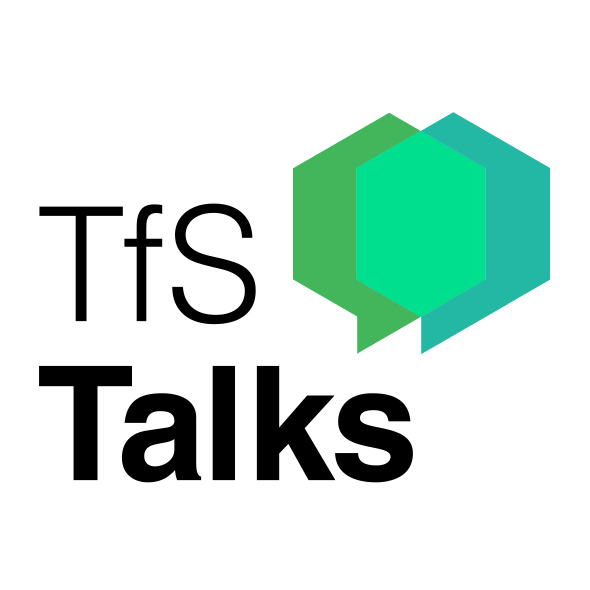

Attended by nearly 90 participants, the first #TfSTalks webinar on 13 January 2021 focused on the Merck company use case on conflict minerals. Merck’s Sustainability Manager Nina Baumann presented her company’s approach to implementing a solid conflict minerals program. The presentation was followed by a very lively Q&A session.

Strategy Extension
Region in focus: Focus and growth in China
Given the global nature of chemical supply chains, China as the world’s largest chemical producer plays a crucial role for TfS. Therefore, TfS is committed to raising awareness in the chemical industry and promoting its membership in China. Having reached several important milestones in China, TfS continues its efforts to extend its reach into 2021 and beyond.
Despite the COVID-19 pandemic, China’s chemical industry grew by almost 21% in 2020, consolidating its position as the world’s biggest chemical market. It is now not only an important sourcing country for global chemical companies, but also home to a large domestic market. With the Chinese government giving an increasingly high priority to high-quality growth, environmental protection and population health improvement, more and more Chinese chemical companies commit to the idea of ensuring the sustainability of their supply chains. Now is the ideal time for TfS to expand its influence in such an important chemical market as China.
In the past couple of years, TfS has celebrated several major achievements in China. In 2019, we welcomed Wanhua Chemical Group – the first of many Chinese chemical companies we hope will become TfS members in the future. We have also continued to develop our strategic partnership with China Petroleum and the Chemical Industry Federation (CPCIF), which has given us a platform to make our voice heard. In September 2020, TfS successfully delivered supplier training for around 500 participants at the China Petroleum and Chemical International Conference run by CPCIF in Nanjing.
Furthermore, in 2020 TfS organised a series of training webinars for TfS members and their suppliers in China reaching more than 300 suppliers. The webinars, two of which were in Chinese and one in English, covered the EcoVadis process and Corrective Action Plan (CAP) and were attended by several hundred participants. Last but not least, TfS has continued to actively update its WeChat page – the most popular social media app in China – to keep its followers informed on TfS activities locally and around the world.
We strongly believe that this is just the beginning of TfS establishing its strong foothold in China. Our goals are to make the TfS name well-known in the local chemical community and to attract more Chinese company members. Current efforts to achieve these goals include the following:
- TfS evaluates options including establishing an office in China to make it easier to grow and support its member network
- TfS in China is currently in discussion with two local chemical companies to join as members
- For 2021, TfS will increase local communication in China supported by a public affairs and strategic communications agency. This includes the localisation of TfS China messages, mapping of key media outlets to engage with, and actively manage the TfS WeChat account.
To conclude, TfS has a strong potential for growth in China and we will do our best to realise it.

Spotlight on
One year of The Sustainable Procurement Pledge
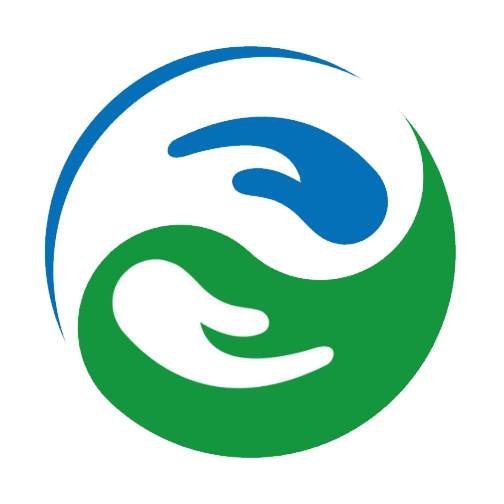
It has been more than a year since our TfS President and Henkel CPO Bertrand Conquéret and Thomas Udesen, CPO of Bayer, co-founded the Sustainable Procurement Pledge (#SPP). Their idea was to introduce a grassroots initiative addressing procurement individuals involved in procurement processes across the globe which allows personal engagement through empowerment and enablement.
As there are plenty of sustainability initiatives addressing top management and corporates, the missing piece seemed to be a movement to which individuals can buy in, realising the impact that they can have on responsible sourcing decisions.
In #SPP’s first year, a lot has happened:
- More than 2,600 individuals across the globe joined #SPP becoming ambassadors for the shared cause, being commitment to drive change through personal contributions and community engagement.
- Around 50,000 people had touchpoints with #SPP either via the homepage www.SPP.earth , the #SPP LinkedIn account and closed #SPP Ambassador group or in multiple virtual events where members of the #SPP Steering Group shared information about the pledge.
- People from 363 different locations, in 76 countries, across all industries and seniority levels were attracted by #SPP content and show a high engagement level in the different #SPP channels.
- The #SPP Steering Group has grown to 12 passionate and motivated team members who all invest their free time, their passion and energy in pivoting the pledge to the next level.
- At the end of 2020, the Steering group split into five workstreams which direct the progress and strategic roadmap to 2030 in the areas of governance, partnerships, capacity building, advocacy and funding.
- The strategy envisages expansion in many ways:
- #SPP will become a non-profit organisation under German law.
- #SPP will seek funding from public and private donors who believe in #SPP’s purpose.
- #SPP will formalise a Community Charter Matrix along three leading dimensions: country charters, industry charters, and topic charters.
- Via a two-vector approach, #SPP will EMPOWER & EQUIP its ambassadors with all the necessary knowledge to build confidence and ENCOURAGE leaders across companies and society to collaborate on simple, pragmatic solutions.
- The overarching goal of #SPP is to mobilise 1 million procurement individuals by 2030 to become #SPP Ambassadors, embracing responsible sourcing decisions in their daily work.
TfS is not only a great role model for #SPP, but has also been a supporter, promoter, and companion since its induction. We thank you all very much for your support, sincere feedback, and for being friends and buddies to us. We would be very happy if you continue to promote and support #SPP and help us meet our goal of engaging 1 million procurement people by 2030!
To learn more about #SPP and to become a #SPP Ambassador, please check out our webpage www.SPP.earth or contact Thomas Udesen, Bertrand Conqueret, or Astrid Bosten.
Useful resources
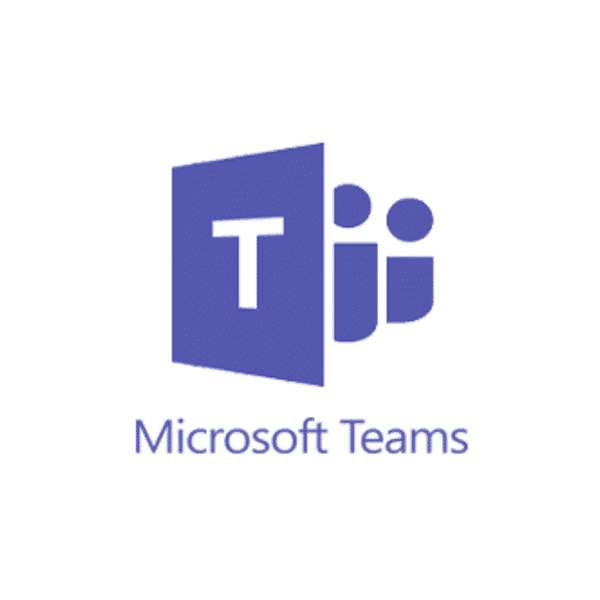
TfS Teams
Collaborative working platform for several workstreams or joint TfS projects; to be used by people invited to a Workstream or project; Workstream Chair or Co-Chair decides on invitation











